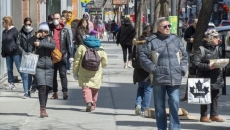MONTREAL - New polling results suggest Canadians are largely indifferent to King Charles, and more than half believe his May 6 coronation is the right time for the country to reconsider its ties with the monarchy.
The web survey of 1,544 adults released Tuesday by market research firm Leger indicates many Canadians are greeting the ascension of Charles to the throne with a shrug.
Only 12 per cent of respondents said it was good news that Charles is now King, compared to 14 per cent who said it was bad news and 67 per cent who were indifferent.
Only 13 per cent of those surveyed said they felt a personal attachment to the monarchy, compared with 81 per cent who didn't.
The survey found the level of attachment to the monarchy has dropped since the days immediately following Queen Elizabeth's death last September, when 19 per cent said they felt an attachment and 77 per cent said they didn't. Indifference to Charles has also risen in the same period.
A majority of respondents said it's the right time for Canada to reconsider its ties with the monarchy, with 56 per cent in favour and 44 against.
Anti-monarchy sentiment was strongest in Quebec, where 71 per cent said it was time to reconsider ties.
Indifference to Charles' ascension to the throne spanned all age groups and regions of the country, although the new monarch was viewed more favourably in Manitoba and Saskatchewan and among Canadians aged 55 and older. Once again, the lowest level of positive reviews was in Quebec, where only seven per cent agreed it was a good thing that Charles is King.
King Charles' coronation will take place May 6 at Westminster Abbey and will be marked by a procession, a concert at Windsor Castle and other events.
While 44 per cent of respondents said they were aware of the event, 73 per cent said they weren't interested. Twenty-seven per cent of respondents expressed interest, but only six per cent said they were very interested.
Sixty per cent of respondents said they were not going to watch television or video coverage, compared to 17 per cent who said they would and 23 per cent who weren't sure.
Polling was done between March 10 and March 12. A margin of error can't be assigned to the survey because it was conducted online and not at random, but Léger says the margin of error for a comparable random, or probability, sampling would be 2.49 percentage points, 19 times out of 20.






